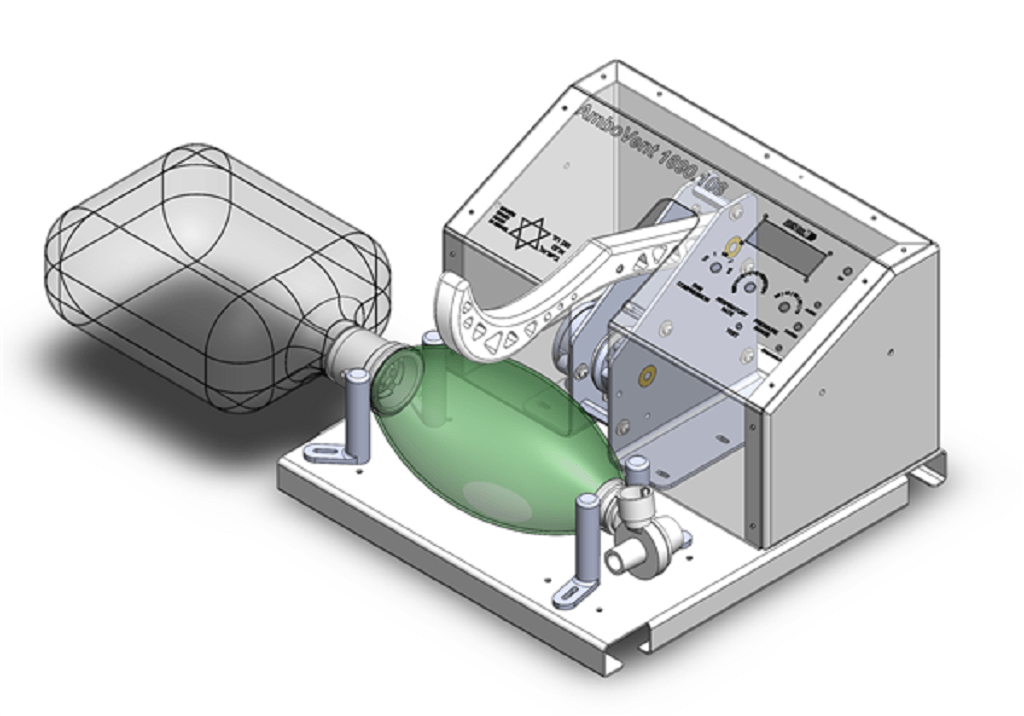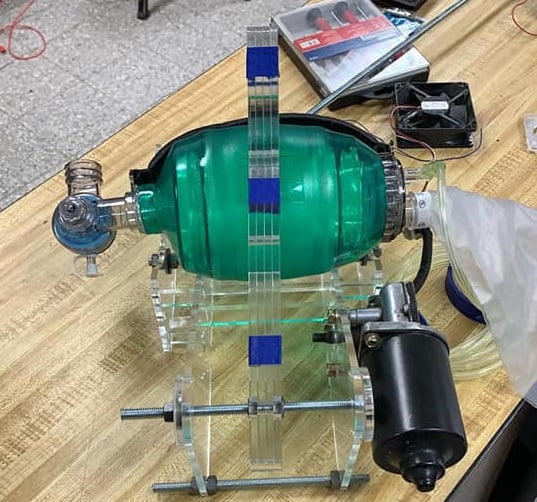Amid a global shortage of ventilators – a potentially life-saving device for coronavirus patients in severe or critical conditions – an Israeli group made up of Air Force electronics experts, robotics specialists, and medical professionals has come up with an innovative hack that could help hospitals around the world produce them quickly and at low cost.
The development of the alternative emergency ventilation system, called AmboVent-1690-108, is based on a bag valve mask, also known as an Ambu Bag, a manual, hand-held resuscitator that provides pressure ventilation to patients who have stopped breathing or who are not breathing properly. The system consists of a motor, a microprocessor development board, and an electronic circuit that connect to the ventilator manually and activate it to provide automated, volume-controlled ventilation (VCV). This sets the rate of machine activity and controls the volume of air provided for each beat.
Off-the-shelf components of the AmboVent include a snowblower motor, a controller, a development board, and a pressure sensor.
Many severely or critically ill patients suffering from COVID-19, caused by the novel coronavirus known as the SARS-CoV-2 virus, require mechanical ventilation to keep them breathing and to deliver oxygen to their bodies after their lungs give out. Countries the world over, including Israel, are struggling with a shortage as the disease has spread widely, killing over 65,00 people and infecting over 1.2 million, almost 40,000 of them in serious condition (as of April 5).
Israel’s AmboVent project was led by Maj. Dr. David Alkaher, the CTO and innovation leader of the Israeli Air Force’s Unit 108, a confidential unit that serves as the force’s electronics specialists and is responsible for weapons and air-defense systems, UAVs, and the like. The system was developed jointly with over 40 partners including Magen David Adom (MDA), Microsoft Israel’s Garage program, which focuses on hack culture, the Israel Aerospace Industries (IAI), FIRST Israel, a Technion-led robotics competition for high school students, the Tel Aviv Sourasky Medical Center (Ichilov), and Hadassah Hospital in Jerusalem.

The system itself was developed in a matter of 10 rather sleepless days, says Dr. Eitan Eliram, an entrepreneur who runs an innovation agency and was formerly the director of new media at the Prime Minister’s Office.
Now, the team is offering the source codes, parts lists, and engineering designs for free to medical teams and professionals around the world so they can follow the instructions, and produce and deploy the hack in their countries to save the lives of coronavirus patients. The Media Innovation Lab (miLAB) at the Interdisciplinary Center (IDC) in Herzliya played a role here, translating the information and specifications from Hebrew into English, German, Italian, and Spanish.
The specifications were released on GitHub late last week and have generated tens of thousands of views and requests for details and information, Dr. Eliram says.
Eliram joined the project to coordinate communications and cooperation with global “makers, hackers, and engineers” who want to produce the device, but the system is “really meant for hospitals only because they are where the bottleneck is and they don’t have enough ventilators,” he tells NoCamels. “We’re seeing it in New York, in Italy, Spain, and the UK.”

The AmboVent has undergone laboratory trials at Hadassah and Ichilov and has been rated as a leading solution among dozens of open source COVID-19 pandemic ventilator projects worldwide by volunteers at Public Invention and EndCoronaVirus.org. It received a rate of 4 (out of 5) for buildability, testing, COVID-19 suitability, and clinician friendliness, but 3s for reliability testing and manufacturability by the thousands.
The Israeli team says the AmboVent also meets the Rapidly Manufactured Ventilator Systems specifications set out by the UK’s Medicines & Healthcare Products Regulation Agency of a “minimally (and some preferred options) clinically acceptable ventilator to be used in UK hospitals” during the pandemic.”
But the system has yet to be tested clinically, is not yet approved for medical use and is currently being evaluated by the Israeli Health Ministry.
“It is not a medical device yet,” Dr. Eliram tells NoCamels. “We need to do a few more tests and build a better version. There’s a whole regulatory process but we are receiving guidance from the Health Ministry on our path toward testing.” Given the situation, he says, there has to be a way to “compress the process because the AmboVent can save lives.”
The AmboVent system was written as an Open code and released, April 2nd 2020.
— The1nn0v8er (@the1nn0v8er) April 4, 2020
We encourage you: Physicians, clinicians and world experts in the field to join us in an international group that was founded to lead this accelerated process.https://t.co/6J9dDg89UK pic.twitter.com/puIDPbb7v6
“Doctors have told us: ‘In a perfect world, we would say take our time, slow things down and go through the testing process but if we do need to use them, let’s have 500 devices ready now in case of an emergency,” Dr. Eliram says.
Sign up for our free weekly newsletter
SubscribeA trial on pigs is set to commence at Hadassah Hospital in Jerusalem, Dr. Eliram tells NoCamels.
In the meantime, the team has made 20 prototypes to send to its network of physicians, clinicians, and developers across the world so they can get them out to regulators, including in the UK. In the next few weeks, the team hopes to “have great prototypes on the desks of regulators so we can fast-track authorization,” he says.
So far, the team has been “the fastest in the world” to create a working viable, prototype that also makes sense financially. “We’ll set the standard and then go for mass production and that’s where philanthropists, and governments and emergency services come in,” Dr. Eliram explains.
A hospital ventilator costs approximately $40,000 whereas the AmboVent would cost between $500-$1,000 to make, according to the team’s estimates.
A follow-up review of the AmboVent and a comparison with another ventilator project by Public Invention founder Robert L. Read found that “the AmboVent is closer to being clinically suitable and ready to be manufactured by a government or NGO in the 1000s.”
The team behind the AmboVent is now in the process of setting up a not-for-profit organization to begin operating more structurally, and working to develop its network of experts and doctors.
“All the Israelis in this project wanted to save lives. They don’t care about IP [intellectual property] or money, they just wanted to be part of the network of innovators fighting the coronavirus,” Dr. Eliram says.
A race for ventilators amid the pandemic
Israel and other countries have been racing to produce more ventilators as the pandemic tears through countries and communities. Israel currently has about 2,000 ventilators and is bracing to treat more critically ill patients.
The Israeli Defense Ministry issued a directive last month, led by the Directorate of Production and Procurement (DOPP) and the Directorate of Defense Research and Development (DDR&D), to establish local manufacturing capabilities and has recruited Israeli companies and organizations to expand the production of ventilators.
Late last month, the ministry converted a missile production facility to mass-produce ventilators in a project led by IAI and Israeli medical device maker Inovytec. Some 30 ventilators have already been delivered to the Health Ministry.
The Defense Ministry has also tapped Israeli companies Flight Medical, which manufactures portable life-supporting respiratory ventilators for home and hospital care, Baya Technologies, which manufactured digital products for the defense and medical industries in Israel and abroad, as well as Israeli defense technology company Rafael to expand ventilator production lines. On Sunday, the ministry said it delivered 63 ventilators produced as a result of this joint venture to the Health Ministry and that hundreds more will be manufactured in the coming weeks.

“The State of Israel is developing independent capabilities in its fight against COVID-19. This independence is essential to the national effort. We must not remain dependent on procurement from other countries. The Ministry of Defense and the IDF will continue to operate in full force within the national campaign against [the] corona[virus],” said Defense Minister Naftali Bennett in a statement.
The director of the DDR&D, Brig. Gen. (Res.) Dr. Dani Gold said that Israel’s “defense industries have unparalleled capabilities- able to manufacture components quickly and in great quantities, whether it’s for weapon systems or ventilators. This eliminates our dependence on imports. We are working to widen the cooperation in this field and to further expand joint production lines for both defense and medical purposes.”
Related posts

Editors’ & Readers’ Choice: 10 Favorite NoCamels Articles

Forward Facing: What Does The Future Hold For Israeli High-Tech?

Impact Innovation: Israeli Startups That Could Shape Our Future




Facebook comments